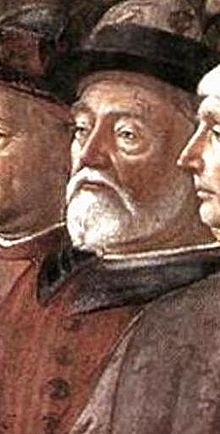
Back جون أرجيروبولوس Arabic جون ارجيروبولوس ARZ Giovanni Argiropulo Breton Joan Argiròpul Catalan Johannes Argyropulos German Ιωάννης Αργυρόπουλος Greek Johannes Argyropoulos Esperanto Juan Argirópulo Spanish Johannes Argyropulos Finnish Jean Argyropoulos French
John Argyropoulos | |
|---|---|
 John Argyropoulos as depicted by Domenico Ghirlandaio in 1481 in the Vocation of the Apostles fresco in the Sistine Chapel, Rome.[2][3][4][5] | |
| Born | Ioannis Argyropoulos c. 1415 |
| Died | 1487 |
| Nationality | Greek[6] |
| Education | University of Padua (Theol. Dr., 1444) |
| Era | Renaissance philosophy |
| Region | Western philosophy |
| School | Renaissance philosophy Aristotelianism |
| Institutions | University of Constantinople (1448–1452)[1] Neoplatonic Florentine Academy (1456–70)[1] |
Main interests | Rhetoric, theology |
John Argyropoulos (/ɑːrdʒɪˈrɒpələs/; Greek: Ἰωάννης Ἀργυρόπουλος Ioannis Argyropoulos; Italian: Giovanni Argiropulo; surname also spelt Argyropulus, or Argyropulos, or Argyropulo; c. 1415 – 26 June 1487) was a lecturer, philosopher and humanist, one of the émigré Greek scholars who pioneered the revival of classical Greek learning in 15th century Italy.[10]
He translated Greek philosophical and theological works into Latin besides producing rhetorical and theological works of his own. He was in Italy for the Council of Florence during 1439–1444, and returned to Italy following the Fall of Constantinople, teaching in Florence (at the Florentine Studium) in 1456–1470 and in Rome in 1471–1487.[1]
- ^ a b c Spyros Panagopoulos, "Higher Education in Byzantium"
- ^ Sleptzoff, L. M. (1978). Men or supermen?: The Italian portrait in the fifteenth century. Magnes Press. p. 68. OCLC 4331192.
Cf. E. Steinmann, Ghirlandaio, Leipzig, 1897, pp. 18-21, and pl. 10 and 13, who recognizes, among the members of the Florentine colony in Rome, Argyropoulos and Giovanni Tornabuoni.
- ^ Burnell, Frederic Spencer (1930). Rome. Longmans, Green & co. p. 217. OCLC 7141638.
We may perhaps recognize, in the group on the right, the bearded head of the famous Greek scholar, Argyropoulos, and, immediately to the left, the wealthy banker, Giovanni Tornabuoni
- ^ Marle, Raimond van; Marle, Charlotte van (1923). The development of the Italian schools of painting, Volume 13. M. Nijhoff. p. 30. OCLC 162830458.
Among the portraits Herr Steinmann has succeeded in recognizing the Greek, Jean Argyropoulos, commentator of Aristotle, who is the old man with a long beard, the papal treasurer, Giovanni Tornabuoni ... he is the clean-shaven man to the right of Argyropoulos while the oldest of the three boys might be Lorenzo, the son of Giovanni Tornabuoni.
- ^ Davies, Gerald Stanley (1909). Ghirlandaio. Methuen and co. p. 53. OCLC 192133437.
Next to him a greybearded man with a flat hat, seen only head and shoulders, is with tolerable certainty recognised as the Greek humanist, Johannes Argyropulos, the translator into Italian of Aristotle. He had been invited by Cosimo dei Medici
- ^ Masters, Roger D. (1999). Fortune Is a River: Leonardo Da Vinci and Niccolo Machiavelli's Magnificent Dream to Change the Course of Florentine History. Plume. p. 55. ISBN 0-452-28090-7.
Cosimo was also a lover and exalter of literary men; he therefore brought Argyropoulos to Florence, a man of Greek birth and very learned for those times, so that Florentine youth might learn from him
; Magnus, Laurie; Boas, Frederick Samuel (1934). A history of European literature. I. Nicholson and Watson. p. 72. OCLC 1614734.Foremost among the interpreters was the Greek, Johannes Argyropoulos, who lectured in Florence to Politian and in Rome to Johann
- ^ James Hankins, Humanism and Platonism in the Italian Renaissance, Volume 1, Ed. di Storia e Letteratura, 2003, p. 207.
- ^ Geanakoplos, Deno J., Constantinople and the West: Essays on the Late Byzantine (Palaeologan) and Italian Renaissances and the Byzantine and Roman Churches, University of Wisconsin Press, 1989, p. 111.
- ^ Christine Raffini, Marsilio Ficino, Pietro Bembo, Baldassare Castiglione: Philosophical, Aesthetic, and Political Approaches in Renaissance Platonism, P. Lang, 1998, p. 21.
- ^ "John Argyropoulos". www.britannica.com. Retrieved 2009-10-02.
John Argyropoulos Byzantine educator born 1415, Constantinople [now Istanbul, Turkey] died June 26, 1487, Rome, Papal States [Italy] Byzantine humanist and active promoter of the revival of Classical learning in the West.
; Doby, Tibor (1963). Discoverers of blood circulation: from Aristotle to the times of da Vinci and Harvey. Abelard-Schuman. p. 252. OCLC 315911202.; Rabil, Albert (1991). Knowledge, goodness, and power: the debate over nobility among quattrocento Italian humanists. Medieval & Renaissance Texts & Studies. p. 197. ISBN 0-86698-100-4.John Argyropoulos (c. 1415-87) played a prominent role in the revival of Greek philosophy in Italy. He came to Italy permanently in 1457 and held
© MMXXIII Rich X Search. We shall prevail. All rights reserved. Rich X Search